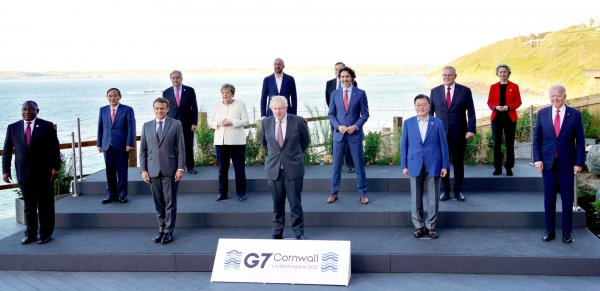
The 47th G7 summit was held between June 11 and 13 at Cornwall of the U.K.. The G7 is an organization of seven of the world’s most advanced economies (Canada, France, Germany, Italy, Japan, the U.K., and the U.S.) and the E.U. that usually meet annually. Though the G7 cannot pass laws, it can make promises and decisions that have effects worldwide. South Korea was invited along with India, Australia, and South Africa, showing our nation’s heightened global status.
The main topics of discussion were COVID-19 vaccines, climate change, responses to China’s rise, and tax havens among many others. The G7 members published the results of the discussion in the G7 communique.
Although far short of what is needed, G7 pledged to donate one billion COVID-19 vaccines over the next year to developing countries. The WHO director-general Tedros Adhanom Ghebreyesus warned that 11 billion doses were needed to truly end the pandemic.
Developed nations have ordered many times the dose they need, vaccines that could be used to save the lives of front-line workers and high-risk people in developing countries. Donating vaccines is a high-return investment on the world economy; the IMF recently estimated it would cost just $50 billion to vaccinate 60% of the world’s population by the middle of next year. The IMF estimated that this would generate $9 trillion in additional economic output by 2025. This would only cost 0.13% of the G7’s GDP.
The G7 pledged yet again to curb climate change. The communique set a target of halving carbon emissions by 2030. It renewed its pledge of delivering $100 billion per year to developing countries until 2025, first made in 2009, but this is yet to be delivered. It also pledged to end coal finance by 2022 and offered developing nations $2.8 billion to help them switch to cleaner fuels.
In competition with China’s Belt and Road Initiative (BRI), the G7 members proposed the Build Back Better World (B3W), which will help developing countries with large infrastructure projects. However, the B3W has been criticized as lacking detail and financial commitment. It has been proposed that the G7 and the invitees apart from South Africa form an expanded group of democratic countries called the D10, as an opposing force to China and other authoritarian states. South Korea is cautious of angering China, a main trading partner, while supporting democratic protests such as in Hong Kong and maintaining political ties with democratic nations.


